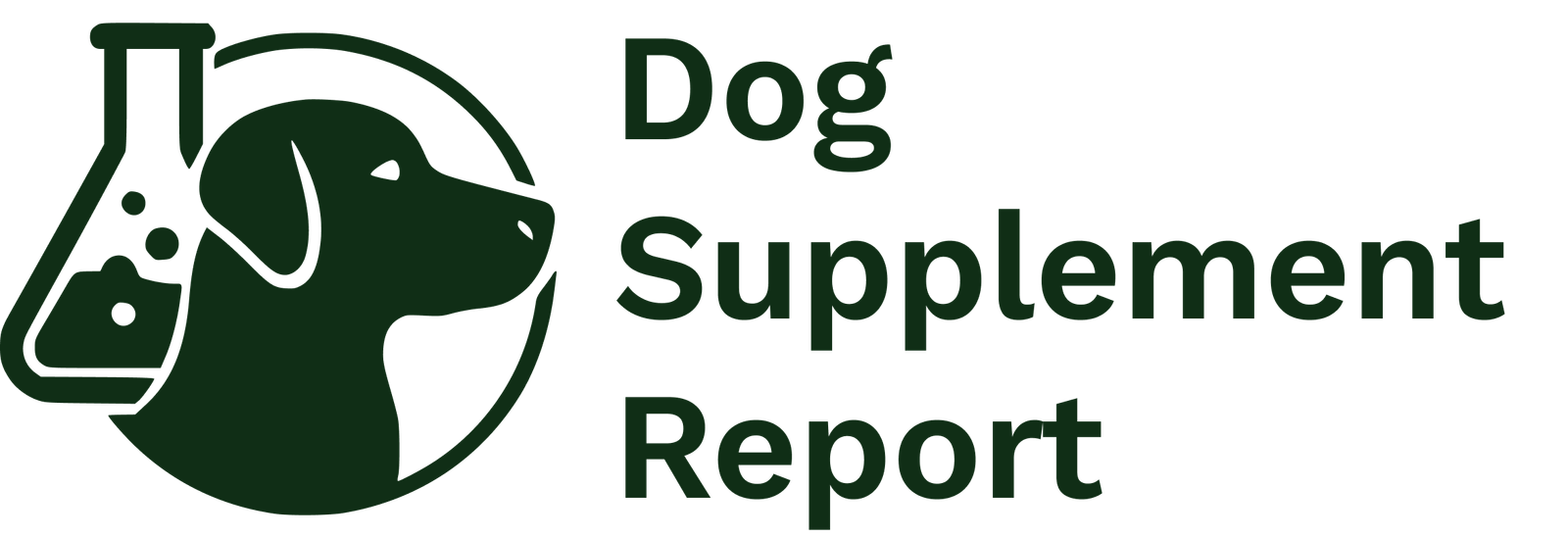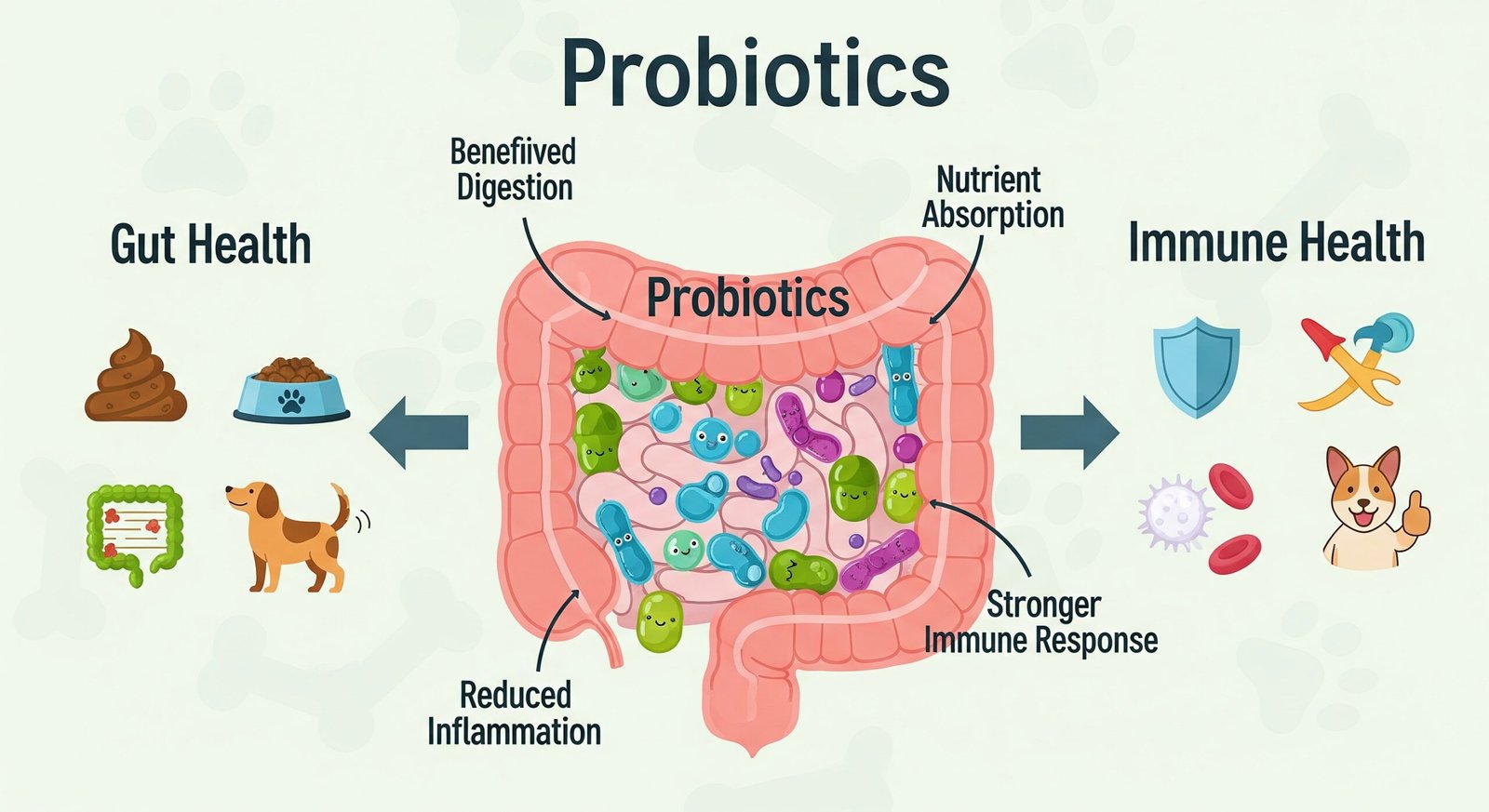Key Takeaway: Probiotics—live microorganisms that confer health benefits when administered in adequate amounts—enhance canine gut health by rebalancing the intestinal microbiota, strengthening the gut barrier, producing beneficial metabolites (e.g., short-chain fatty acids), inhibiting pathogens, and modulating immune responses. Clinical trials demonstrate reduced diarrhea duration, improved stool quality, and elevated mucosal and systemic immunoglobulins in dogs supplemented with specific probiotic strains.
1. Rebalancing the Gut Microbiota
In healthy and diseased dogs alike, probiotics can shift microbial communities toward a more favorable composition:
- Increased beneficial bacteria: Supplementation with a multistrain probiotic (e.g., Slab51® containing Lactobacillus and Bifidobacterium species) raised fecal Lactobacillus and Bifidobacterium counts in healthy dogs.
- Reduced opportunistic pathogens: The same mixture reduced Clostridium perfringens abundance.
- Enhanced microbial diversity: Probiotics containing Lactobacillus casei, L. plantarum, and Bifidobacterium animalis improved microbial diversity in dogs with diarrhea, while lowering pathogenic bacteria.
2. Strengthening the Intestinal Barrier
Probiotic strains support epithelial integrity and barrier function:
- Tight junction proteins: Dogs with idiopathic inflammatory bowel disease showed upregulation of E-cadherin, occludin, and zonulin after Visbiome® therapy.
- Mucosal defense: Certain Lactobacillus and Bifidobacterium species stimulate mucin production, enhancing the mucus layer that protects epithelial cells.
3. Production of Beneficial Metabolites
Probiotics foster the generation of metabolites that nourish host tissues:
- Short-chain fatty acids (SCFAs):
- Butyrate and total SCFAs rose in dogs fed Saccharomyces cerevisiae yeast, contributing to colonocyte energy and anti-inflammatory effects.
- SCFA increases correlate with improved stool consistency and gut health.
- pH modulation: Probiotic yeast lowered fecal pH, creating an environment less hospitable to pathogens.
4. Pathogen Inhibition and Colonization Resistance
Probiotics compete with and inhibit harmful microbes:
- Antagonistic activity: Canine-derived Lactobacillus plantarum RW1 inhibited Salmonella adhesion in vitro and tolerated gastric acidity, indicating pathogen suppression capacity.
- Reduced infection rates: Puppies receiving Lactobacillus rhamnosus MP01 and L. plantarum MP02 experienced fewer gastrointestinal infections.
5. Immune Modulation
Probiotics interact with the canine immune system at multiple levels:
- Secretory IgA (sIgA): Dogs fed Slab51® exhibited elevated fecal sIgA, bolstering mucosal immunity.
- Systemic IgG: The same probiotic mixture increased plasma IgG, indicating enhanced systemic immune readiness.
- Leukocyte activity: Enterococcus faecium DSM 32820 stimulated phagocytic and oxidative burst activities of canine leukocytes.
6. Clinical Outcomes in Canine Populations
| Condition | Probiotic Intervention | Outcome |
|---|---|---|
| Acute diarrhea | 2×10¹⁰ CFU/day Bifidobacterium animalis AHC7 | Faster resolution of diarrhea vs. placebo |
| Acute hemorrhagic diarrhea | Visbiome® (8-strain blend) | Accelerated clinical recovery and microbiome normalization |
| NSAID-associated diarrhea | L. fermentum + L. rhamnosus + L. plantarum | Reduced diarrhea frequency |
| Healthy dogs (stool quality, odor control) | Bacillus subtilis + B. licheniformis | Improved fecal score, reduced odor and biogenic amines |
| Chronic enteropathy (IBD) | Multistrain Visbiome® | Increased tight junction protein expression, clinical remission |
7. Practical Recommendations for Dog Owners
- Choose Canine-Specific Strains: Opt for products containing Lactobacillus and Bifidobacterium strains isolated from dogs, as host-derived strains often adhere better and survive gastric transit.
- Adequate Dosage: Aim for ≥10⁹–10¹⁰ CFU per day, as used in successful clinical trials.
- Targeted Use:
- Acute diarrhea: A B. animalis AHC7 regimen for 7–10 days can shorten symptom duration.
- Chronic GI disorders: Multistrain formulations over 4–8 weeks may restore mucosal health and immune balance.
- Monitor Response: Assess stool consistency, frequency of GI upsets, and overall vitality over 2–4 weeks; adjust or discontinue based on clinical outcomes.
- Quality Assurance: Select veterinary-recommended brands with published clinical data to ensure efficacy and safety.
Conclusion
Scientific evidence underscores that well-characterized probiotics support canine gut and immune health by reconfiguring the microbiota, enhancing barrier integrity, producing beneficial metabolites, suppressing pathogens, and modulating immune defenses. When chosen and administered appropriately, probiotics represent a valuable adjunct in the prevention and management of gastrointestinal and immune-mediated conditions in dogs.

